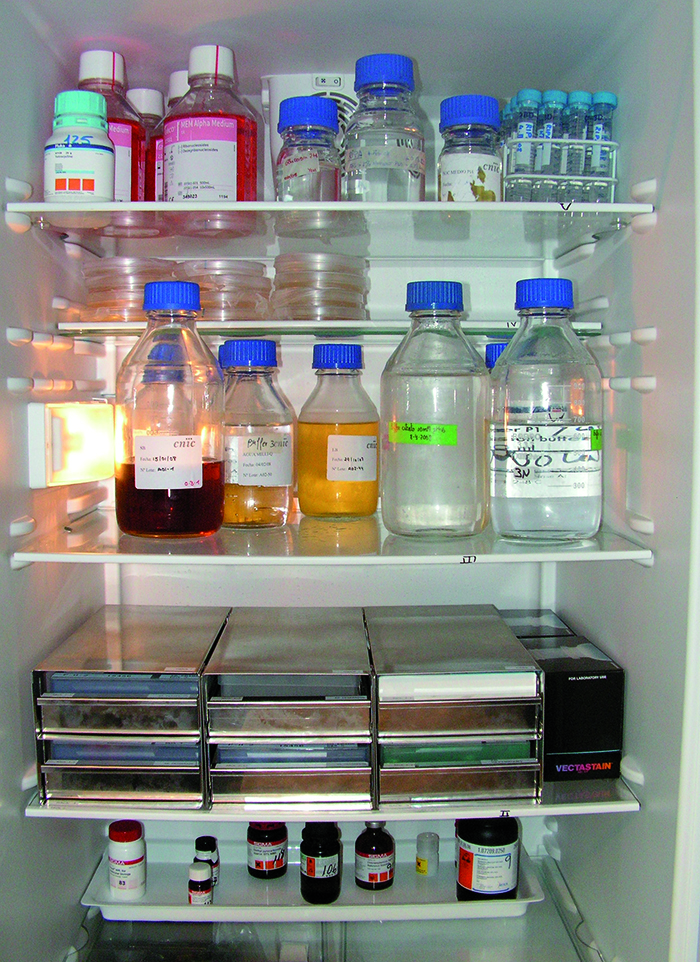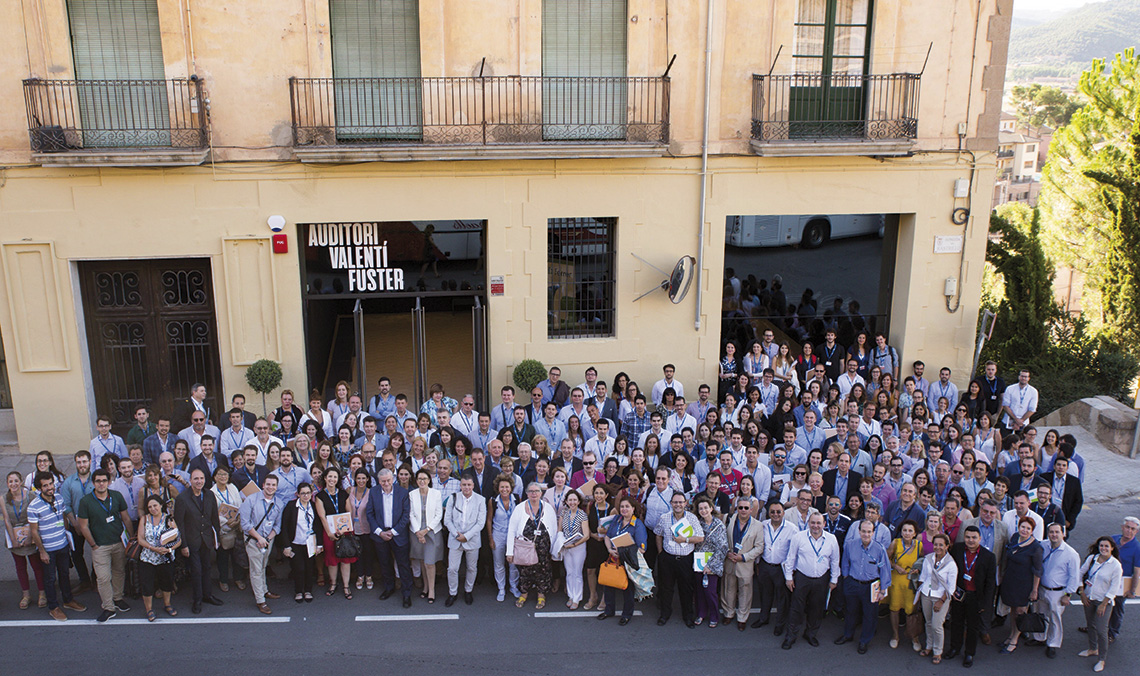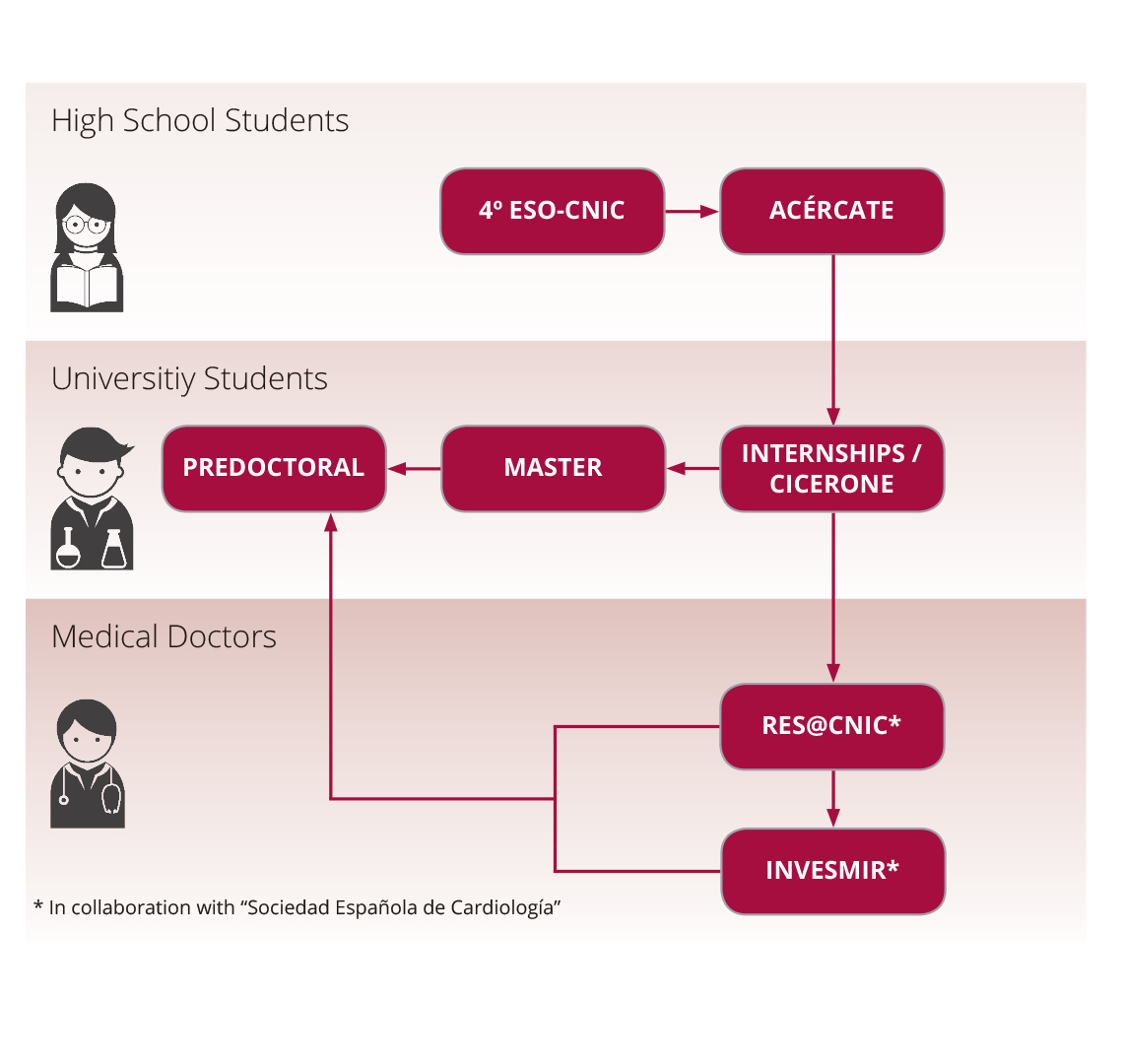Training programs and continuing
education
education
Training is one of the CNIC’s core activities, and the Center has devised a comprehensive training plan, the CNIC Joven Training Plan. This global plan includes programs for participants at all levels, from high school students to postdoctoral researchers and MDs. The CNIC Joven Training Plan aims to fulfill the personal goal of Valentín Fuster “to attract and train the brightest young people from the earliest ages to create a pool of excellent researchers in the field of cardiovascular research.”
In 2017, 645 participants were enrolled on CNIC training programs and continuing education courses.

Programs for high school students
‘ACÉRCATE’: Grade A+ science students train
at the C
at the C
The ACÉRCATE Program offers the highest-achieving senior high school students in the natural and health sciences the chance to experience life as a biomedical researcher, with the aim of awakening and strengthening interest in a biomedical research career.
Participants spend two weeks at the CNIC, learning modern techniques used in biomedical research, conducting supervised experiments, operating sophisticated scientific equipment and presenting the results of their work, all under the supervision of CNIC researchers.
Fellowships in 2017: 8

The CNIC collaborates with Community of Madrid high schools in the following training programs:
- 4º ESO-CNIC
Five life-science students spent from 3 to 5 days exploring possible scientific careers.
- Practical experience for Technical School students
This program brought ten technical school students studying “Anatomy Pathology and cytological diagnosis” and “Image for Diagnosis and Nuclear medicine” to gain practical experience in the CNIC’s laboratories.
Programs for undergraduate students
Internships are offered to university students in the following programs:
Cicerone Program
The Cicerone Program is open to advanced undergraduate students and Master’s students in biomedicine-related dsiciplines. Participants extend their scientific training through hands-on experience of laboratory-based biomedical research during the summer recess. In addition to carrying out a supervised research project, the students also attend CNIC seminars and workshops. The aim of the program is to give students first-hand knowledge of biomedical research so that they can make informed choices about the possibility of pursuing a scientific career.
Fellowships in 2017: 30
Curricular and Extracurricular University Practical Program
The CNIC offers practical training in cardiovascular research to visiting undergraduate and postgraduate students, including those on Erasmus internships, completing their Trabajo Fin de Grado (TFG, degree dissertation), Trabajo Fin de Máster (TFM, master’s dissertation).
Internships in 2017: 82

Programs for graduate students
- CNIC Master’s Fellowship Program
- Fundación Carolina BBVA-CNIC Master’s Fellowship Program
These grants provide funding for students studying for a master’s degree at a Spanish university to conduct their experimental project in a CNIC laboratory.
Fellowships in 2017: 15
Predoctoral (PhD) Program
The Predoctoral Program provides a unified framework for all CNIC researchers who are working toward a doctoral degree. All predoctoral researchers are signed up to this program, irrespective of their funding source.
The aims of the program are to ensure uniform quality of predoctoral training at the CNIC and further to ensure fair and equal access of predoctoral researchers to training opportunities.
The Program schedules regular meetings between the predoctoral fellow and his or her thesis committee, composed of the thesis director, another CNIC group leader, and an external expert.
Graduate students at the CNIC awarded a PhD degree in 2017: 19
Graduate students studying for a PhD degree at the CNIC in 2017: 89 (14% foreigners)
Insights into Research in Cardiovascular Disease Masters Module
This postgraduate course is run by the CNIC as part of the Universidad Autónoma de Madrid (UAM) Molecular Biosciences Master’s Program. This optional module provides a broad overview of cardiovascular biology, including perspectives from basic, clinical, and translational research. Attendants at this course are enrolled UAM Master’s students, CNIC predoctoral researchers, and participants on the Res@CNIC SEC Program (see below).
Students in 2017: 15
Programs for MDs in collaboration with
the Spanish Society of Cardiology (SEC)
the Spanish Society of Cardiology (SEC)
RES@CNIC Program
The Res@CNIC SEC Program offers resident medical interns the opportunity during the first years of their specialization period to learn about the latesttechniques in cardiovascular research being used in the CNIC’s laboratories, under the guidance of a CNIC scientist. Residents participating in RES@CNIC also receive training in theoretical aspects of cardiovascular research through an expert-led taught module. The Program also seeks to create links and collaborations so that on conclusion of their MIR specialization period, these professionals will have the chance to undertake research projects in their respective National Health System centers in partnership with CNIC scientists.
Participants in 2017: 20
INVESMIR SEC Program
The INVESMIR Program offers resident medical interns the opportunity during their specialization period to further their training through a research project in one of the CNIC’s laboratories, under the supervision of a CNIC scientist.
An important aim of the program is for participants to establish contacts and collaborations with CNIC researchers that will support them, after completion of their MIR specialization training, in pursuing their own research projects at their centers within the Spanish National Health System.
Fellowships in 2017: 2
SEC-CNIC CARDIOJOVEN Program
The aim of this Program is to foster high-quality translational research in the cardiovascular area in Spanish National Health System centers through training programs providing theory or practical training for cardiologists with a research vocation.
Specific aims:
a) To create the figure of the cardiologistresearcher by providing high-quality training in clinical research methods, including statistical analysis and the latest basic research techniques used in cardiovascular biomedicine, 38 Scientific Report 2017 as well as opportunities to explore any clinical area of cardiology in greater depth (subspecialization). The program is aimed at cardiologists who aspire to carry out advanced clinical and research work at any center within the Spanish National Health System.
b) International training. The Program offers a period of training toward a Master’s Degree in Epidemiology at the London School of Hygiene and Tropical Medicine (90 ECTS).
Candidates receiving awards 2017: 1

CNIC Continuing Education Program
Cardiovascular Pathophysiology Course: From Symptoms to Genes
The two-day Carciovascular Pathophysiology Course is organized in partnership with the Sociedad Española de Cardiología. This course offers resident cardiology interns a translational vision of cardiology by introducing them to the study of pathophysiology and basic research. The 90 participants received an overview of the molecular and genetic factors that underlie cardiac diseases and gain an up-to-date vision of cardiac physiology.
Venue: CNIC Auditorium
Vascular Biology Course
Valentín Fuster delivers this lecture series on Molecular, Clinical and Population Bases of Cardiovascular Disease and Health as part of the Universidad Internacional Menéndez Pelayo (UIMP) summer program, sponsored by Ferrer International.
Valentín Fuster tries to “motivate and teach for the future” more than 280 attendees. Most of the attendees are cardiologists, although others are experts in internal medicine or other specialties. In 2017, delegates came from more than 15 countries, most of them in Latin America and Europe.
Venue: V. Fuster Auditorium, Cardona (Barcelona, Spain)


